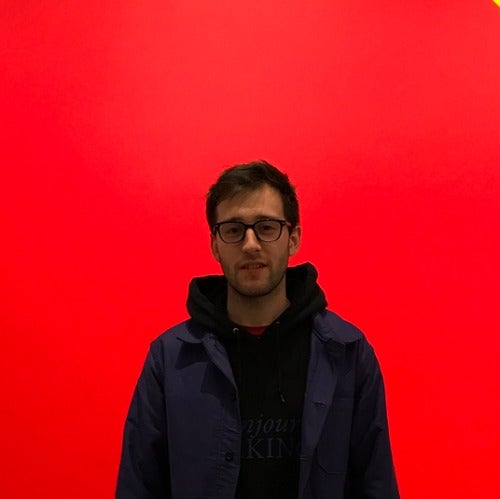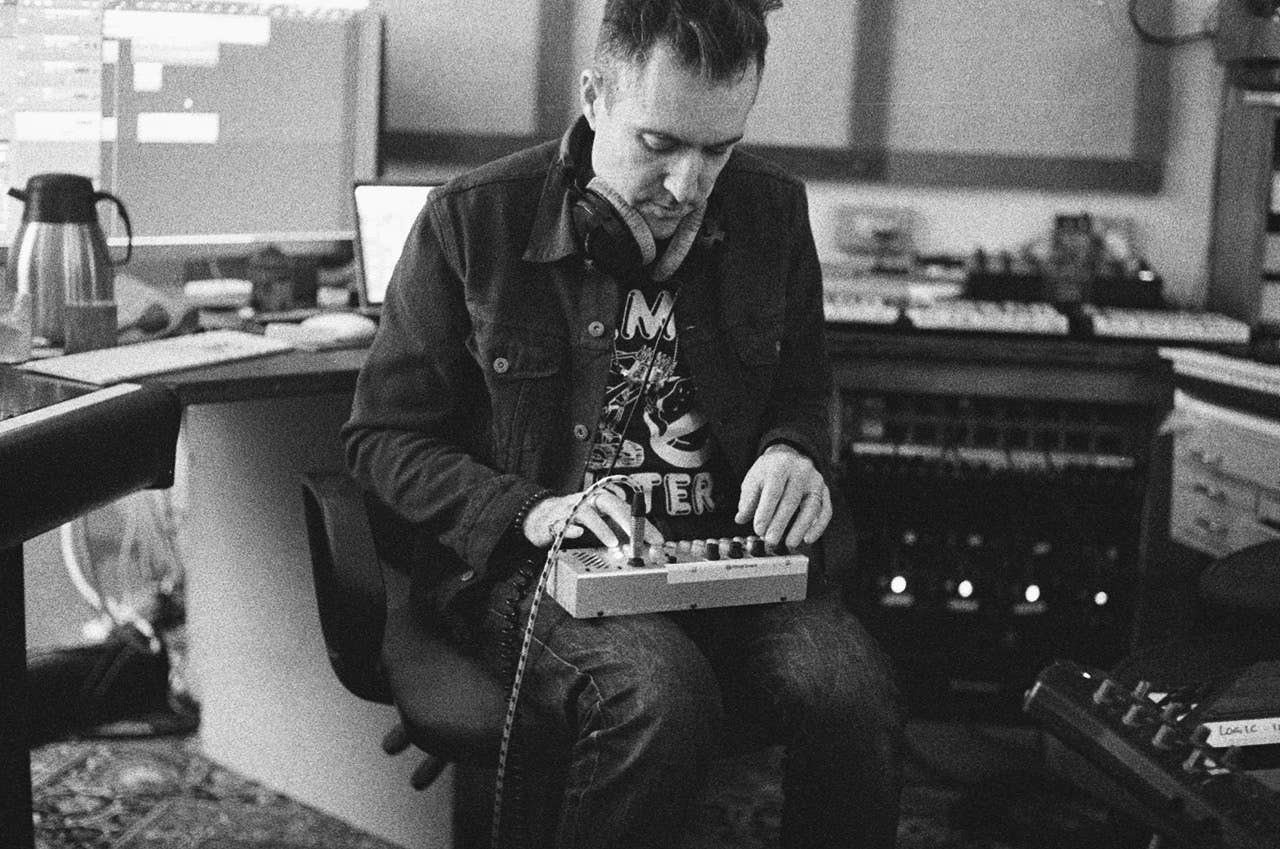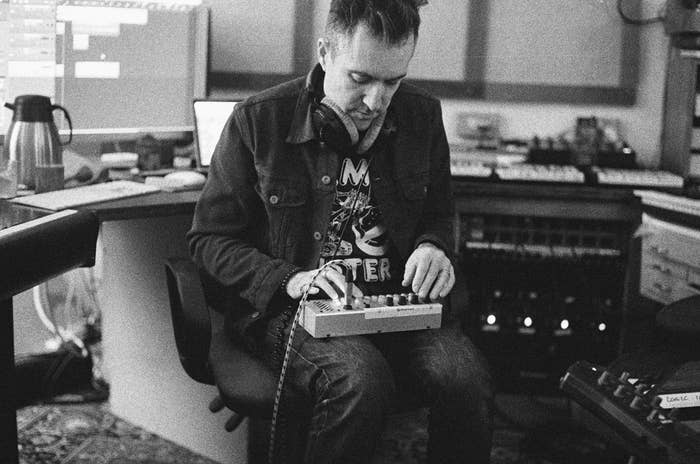
A conversation with Richard Russell is like a history lesson, a therapy session, and a motivational speech all in one. The breadth of his cultural knowledge is immense and his experiences as a DJ, solo artist, record producer, label head, and A&R give him a unique viewpoint on the music industry as a whole. Russell is a founder and owner of XL Recordings, an independent British label which, since 1989, has released music from such varied, boundary pushing acts as Radiohead, Dizzee Rascal, The White Stripes, The Prodigy and Adele.
Giving artists the space to experiment, explore, and learn has been central to the ethos of the label and XL has recently built a recording studio in New York, a peaceful basement space in bustling, tourist-packed SoHo. It is in the studio, his natural habitat, that we meet to talk about Russell’s upcoming album Richard Russell Presents: Everything Is Recorded, which is set to release in 2018.
Wearing an orange shirt and sitting cross-legged among burning incense sticks, Russell speaks softly and thoughtfully, pausing often to assess what he’s saying and drawing parallels between seemingly disparate subjects. An anecdote about surprise front row seats at a Dave Chappelle stand-up show serves to illustrate a point about transcending ego. Purist disdain at the guitar being put through an amplifier is connected with Future and The Weeknd’s use of Auto-Tune in contemporary rap and pop music. An animated explanation of the remarkable talents of British rapper Giggs ends in a quote from Miles Davis.
Although most people would not recognize Russell if they walked past him on the street, his impact on music is undeniable and varied. XL Recordings is a triumph of quality over quantity, and proof that a successful label can focus on a few great records rather than trying to churn out hit after hit. Beyond that is the music that Russell has made for himself and produced for others over the course of 25 years. In 1992, he released a rave single called “The Bouncer” as part of a duo called Kicks Like a Mule, which was a surprise crossover from the underground to the Top 10 of the UK Charts, but it’s in the past ten years that his work as a record producer has come to the fore.
Russell produced Gil Scott-Heron’s 2010 album I’m New Here, which would turn out to be the American artist’s final studio album. “I sought out Gil, I really wanted to make that record with him,” Russell explains. “When we first met, he said, ‘There you are.’ So I think there was definitely something a bit cosmic, for want of a better word, going on there. There was something we were meant to manifest together. The things that have happened since then have just happened, one after the other, a natural evolution.”
Work with Bobby Womack, Damon Albarn, and Ibeyi followed, but the onset of a rare neural disorder called Guillain-Barré syndrome in 2013 became the catalyst for Russell’s own album, Everything Is Recorded. “[Getting ill] got rid of some sort of resistance,” he explains. “I was paralyzed. I had full body paralysis and was in hospital for quite a long time, with a long recovery period. I'd started building my studio before that. That carried on while I was in hospital, so when I was back I had this place to work.”
Extensive, free-form sessions in his London studio and elsewhere with artists like Sampha, Syd, Wiki, Obongjayar, Ibeyi, Giggs, Kamasi Washington, Infinite, and Mela Murder led first to an EP, Close But Not Quite, and then singles "Show Love" and "Mountains of Gold," all released this year. The full album is due out in 2018, but in the meantime journey into Richard Russell's world in an extensive interview covering his work, the state of the music industry in 2017, the ultimate importance of artistic freedom, and much more, below.
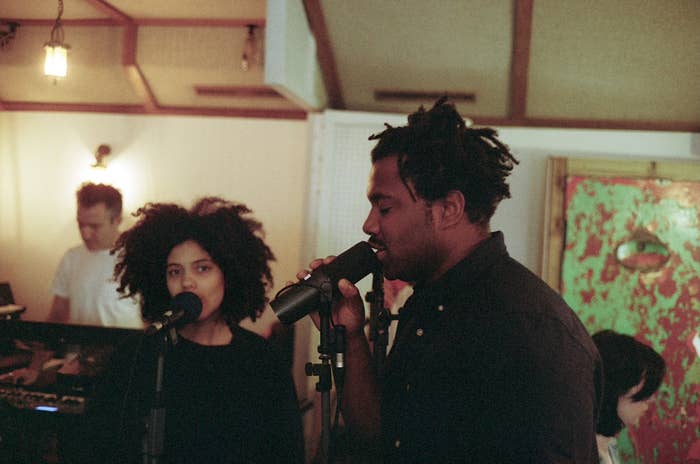
Do you feel any of the same energy here in New York that you did when you moved out here back in the late ‘80s?
I do, although obviously it's changed since then. Socially, economically, culturally, there's always been a huge mix. That's what these places are about, they’re melting pots. This area [SoHo] was very different when I was first out here. This was where artists used to hang out. There were lots of parties. There was a club out here called The Loft way back when, which is now the Mercer Hotel. That's probably quite a good example of what happens.
No question, these places get fucked up by rising property prices. And that does come with a whole bunch of societal problems. I guess I think of everything from a kind of music perspective. I mean, London's pretty on fire at the moment. And people are pretty pissed off. And those two things are linked.
I think that that's eternal, isn't it? Like, what was the blues, you know? It's people singing about life. Pain. Life being really hard. So that's the tradition we're part of.
How did your experiences clubbing and DJing shape you as you then started running a label?
My early clubbing days were in London. Then rave music was what we started doing on the label, which came just after that.
Rave wasn’t about London, it was really more suburban. It was quite looked down on by London and by the media, really. But I was from the suburbs. Actually when Dizzee Rascal first started working with XL, I remember him doing a live interview where someone asked, "Isn't it a bit weird you being on XL? Because it's not really an urban label." And he said, "Well, it's a suburban label." He understood something about that.
It’s not as simple as pop music is for the mainstream and then interesting music is underground. No. I think that's a cop-out, really.
There's a kind of interplay between the suburbs and the center of town in these places. If you’re in the suburbs you're kind of battling to get in the city. In New York, in rap, there were never many artists coming from Manhattan, right? The artists were coming from the Bronx, and from Brooklyn, and from Queens, from Staten Island. In a way, the music gets you into the city.
You released a rave single in 1992 called “The Bouncer” that ended up breaking into the Top 10 on the British charts. Did the surprising commercial success of this track shape your approach at XL in terms of the fact experimental music can be successful in a mainstream way? It seems as though that's a thread running through many of the artists on XL.
The education for me was in a deep and concerted study of The Beatles, which I did as kid because I was obsessed by them. And one thing you get from that is that they were the most original, most interesting, most experimental, most rule-breaking, and they were also the most commercially successful. So it’s deeply ingrained in me that that's possible.
There are elements in the music industry that would love to convince everyone that that is not possible. But that is possible. And so, you fast-forward to now, and who is the most important artist in the world? It's Kendrick Lamar, who is enormously commercially successful—I heard four of his songs on the radio in the cab on the way from the airport today.
He’s making layered, complex message-driven music with immense subtlety and beauty but it's commercially really successful. So, you know, people do need reminding of that. It’s not as simple as pop music is for the mainstream and then interesting music is underground. No. I think that's a cop-out, really.
The people making underground music, that doesn't get widely heard is important, and that's obviously where a lot of things get developed. But you can make wild sounding stuff that gets big. I'm not sure Migos was anyone's idea of a pop record.
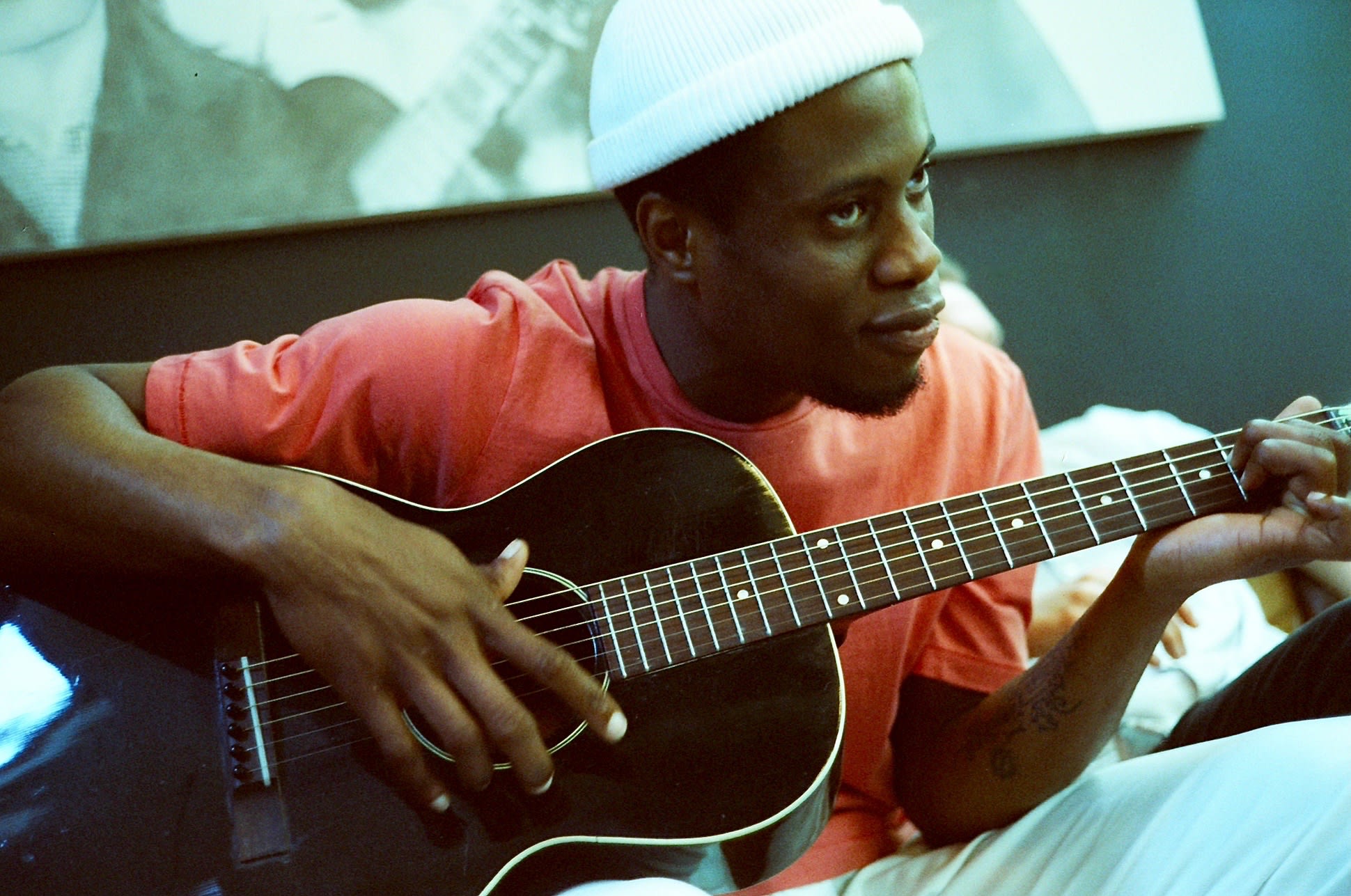
How has this impacted your approach making music for yourself and others?
I my mind I'm always making hip-hop records. They maybe don’t particularly come out sounding like hip-hop records, but that's very British to do that. I think if your love for what your influenced by is deep enough and you're reverential enough towards it while also being irreverent in wanting to do what you're doing, that's powerful. And you can end up then contributing something back into the mix.
There's a dialog. It goes back and forth, you know? Afrika Bambaataa was sampling Kraftwerk. He wasn't really a rapper's rapper, it was more like a chant over an 808. I hear something similar when I listen to Future. And one thing that's exciting about some new rap is that it's like music without a past. It's not reverential towards rap that went before. But there's the 808, so there is that thread to a machine that emerged around 1981.
The producer on a lot of Vince Staples’ new album, Zack Sekoff, said that he spent some time in London and was influenced by UK garage and dubstep. And then Vince is rapping over what almost sounds like a UK garage song.
That's what I love. That's a good example of it. As long as things are done with a heart, I think that the influence just goes back and forth. Even with grime, Dizzee was listening to southern bounce, so that had a big influence on grime. And now you listen to Drake and that grime influence is there. So it's always exciting, that you never can really know what someone's going to pick up on.
I think Auto-Tune is very interesting in the way it's used now, too. We used it on the new Ibeyi record quite a bit and when you start using it, there's an excitement level that can kind of go up in the studio. I've actually started to wonder whether the application of Auto-Tune to the singing voice is the modern equivalent of the guitar being put through an amplifier, which at the time was not liked by the purists.
But obviously it made things very exciting. And I think something slightly similar to that can happen with the voice. You know, the purists are horrified. You know, Future, I believe The Weekend, everything he records, there's always Auto-Tune, that's the basic setting. It's not because people can't sing. Just as the amplifier wasn't because guitarists couldn't play guitar.
When did you decide you wanted to make this solo album?
I sought out Gil Scott-Heron, I really wanted to make that record with him. The things that have happened since then have just happened, one after the other. I definitely didn't have any plan with any of those things. After the Gil record people used to suggest an album, but I didn't think I was ready.
This album came through exploration, through experimenting. And you've got to have an open time-frame for that.
That changed after I got sick. I think that made the big difference, really. That got rid of some sort of resistance. In 2013, I got this thing called Guillain-Barré syndrome, I was paralyzed. I had full body paralysis and was in hospital for quite a long time, with a long recovery period.
I'd started building my studio before that. That carried on while I was in hospital, so when I was back I had this place to work. I really couldn't have made the album without that studio, in terms of bringing in all these collaborators and making it comfortable. And also just feeling like there's no time pressures and no clock ticking. The idea is that these are places where people can explore. This album came through exploration, through experimenting. And you've got to have an open time-frame for that.
How did the sessions at the Copper House grow into an album?
You're not hearing a sprawling improvisational sound on the album. What you're more hearing is samples from a sprawling improvisational process. That wasn’t the plan, I just wanted to have people come in [to the Copper House] and play for enjoyment, for fun, to learn. But because we were doing it in the studio, I did record everything and then I started combing through it.
The combining of the old and the new is part of the process too. It applies in a lot of ways for me—with this record, with making the Gil Scott-Heron record and getting Jamie xx to remix it, being a connector. It struck me when I was doing that, I'm 20 years younger than Gil, I'm 20 years older than Jamie and I'm able to have a completely enjoyable communication with both of them. I understand both of them, they understand what I'm trying to do, and that's a privileged position to find myself in.
That's continued into Everything is Recorded. You've got the old equipment and the new equipment. You've also got the samples of old records; Curtis Mayfield, Grace Jones, Keith Hudson. And you've got new collaborators.
And there's also a little touch of something you asked about at the start. What the city was, versus what it is now. What London was, versus what it is. That clash between innocence and experience. And hopefully out of all of that, where you end up is somewhere timeless, but now.

Can you tell me a little bit about the significance of the title Everything is Recorded? You mentioned that you did record all these sessions but is there a less literal meaning too?
Everyone who's heard it seems to have derived a different meaning from it. People think it's about surveillance, the internet, data capture. I'd never thought of that but obviously that is a big part of life. Other people have thought it's to do with the process of making the record, and I can see that as well, because we did record a huge amount.
But it is actually about near death experience and the life review. That’s what people refer to as their life flashing before their eyes. That's something that I have had experience with and Sampha's had experience with, in different ways. So we set out to make a piece of music based on that theme.
We capture everything via our senses and it's all equally important. One of the lines in the song is, "Every single moment." Life is a series of moments but you can only ever be in one of those moments—that's when something is happening. When you can refer to it as the past, it's already happened. I think it's a slightly difficult concept for us to grasp, but I think the more that people grasp it, the more you can transcend the individual and the ego, which is something I'm very interested in.
You can easily fall into that idea that you’re the center of the universe. But it's not correct, it's not accurate. Everyone's just a ripple but that doesn't mean that you're not important, because there's no ocean otherwise. So you’re very important. But ripples in the ocean aren’t asking, "Oh, am I rippling well? Am I rippling better than that guy?"
So we're touching on that idea. But there's also this clash on the record between a spiritual quality and a kind of carnality that I thought was quite important to have, as well. That's real life. You've always had this thing in soul music of sinning on Saturday and church on Sunday. That clash between the secular and the religious has always been there.
Is it a hopeful record?
There’s a lot of pain in it, and I think that loneliness is definitely a theme that is explored throughout it by everyone, in different ways. But I think the message of, “You're not alone, you're not alone in the struggle,” is a powerful part of it.
YOU CAN EASILY FALL INTO THAT IDEA THAT YOU’RE THE CENTER OF THE UNIVERSE. BUT IT'S NOT CORRECT, IT'S NOT ACCURATE. EVERYONE'S JUST A RIPPLE, BUT THAT DOESN'T MEAN THAT YOU'RE NOT IMPORTANT, BECAUSE THERE'S NO OCEAN OTHERWISE.
"You're beautiful just as you are," is one of Sampha's lyrics on there. I think that those are two kind of powerful messages that have me thinking that it is unquestionably positive and uplifting. But coming from a basis of a fairly sort of dense of chunk of pain, which I think you can hear in there as well.
The samples of old records seem to mostly come from the ‘70s and from soul music. What about that period inspired you while you were making this album?
Curtis by Curtis Mayfield, which has "The Makings of You" on it. Pieces of a Man by Gil. The whole Stevie Wonder run in the ‘70s. Grace Jones. I was a big fan of that band The Main Ingredient, which contained Cuba Gooding, Sr., Cuba Gooding, Jr's dad. There's a song by them called "Just Don't Want To Be Lonely" that's an influence on this whole record. There was a lot of good music, and there was a good sound. The way that records were recorded, there was definitely kind of a sweet spot there in '70s soul music of analog warmth.
Of course, when the electronics started creeping in, into '80s songs, that was also great. I loved that as well. That was also exciting. Sly Stone did that. Sly Stone used a drum machine. That sparked something for me. I think that combination of man and machine is very deeply ingrained in what I do.
Then it became rap in the '80s, like Marley Marl era, that's a real clash of man and machine. Whether it was like Marley Marl's James Brown samples or Rick Rubin's more 808 based stuff, there's a clash between man and machine there, which is just really exciting. That excites me. It's not about the technology, it's about the clash between the technology and the humans.

You have artists who a lot of people will recognize like Sampha, Syd, and Wiki, but there are unknown artists like Infinite who is on three tracks, including one with Peter Gabriel.
There's a lot for both parties to gain out of that. I've got a strong sonic taste, I suppose, and an idea of what things are meant to sound like. It's slightly hard to put into words, but it's something I can express when I'm working on things. So I think in that regard, it wasn't difficult to make this into a coherent whole, because there’s a kind of sonic thread which I think is very hip-hop and soul influenced.
Infinite's voice, to me, echoes Chicago house music very directly. Chicago house music, which I was listening to in acid house parties in London when I was a teenager in the late '80s. That gospel, lonely quality, he embodies that. I played him a lot of Chicago house stuff. And there’s a track "Be My Friend" which is very much a tribute to that.
Can you talk a bit about Giggs, and why he’s so special?
I've been working with him for a while now. I mean, Giggs really started a new era in rap music in the UK. Giggs wasn't a grime artist, Giggs was making what people called "road rap." And what he was doing definitely spoke very directly to people. In some ways, it was less specialist than grime. He's very much a people's artist and he's really loved for that. He has had an extreme life and seen extreme things, which he's able to talk about in his music.
The first line I heard of his that made me think there's something very special going on was on a track of his called "Soldier Riddim," which was on an early mixtape. He said, "I'm putting 'caine on the street for paper, I put my pain on a sheet of paper." There’s that combination of talking about his realities, but also saying, "I am a poet." He's just able to express that very directly, but with immense humor and honesty. He's very funny and he doesn't give a fuck. And I suppose that is the kind of the new rock and roll, isn't it?
it's nice for people to turn up on time to some extent. But it's not mandatory to me. What's mandatory is the inspiration and the creativity of the work.
But it's not the way for every artist out there. There are a lot of artists who are thinking, "Oh, should I be doing this, should I be doing that? Should I be doing that for the radio? Should I be doing this for this media outlet? Should I be on this."
That's not what it's about. The point of being an artist is that you can do what you want. You don't have to do anything. I mean, you've got to be good enough to pull that off, but I think there's a careerism that's crept in that's very unappealing to me.
Obviously it's good if people are functional and it's nice for people to turn up on time to some extent. But it's not mandatory to me. What's mandatory is the inspiration and the creativity of the work. In Miles Davis' autobiography, he talks about not turning up for things, and he says, "I never understood why people made a fuss about this." People ask, "Do you want to do that show in three weeks time?" It's like, I don't know if I'm gonna be creative on Thursday in three weeks time at 8:30!

People consume music in new ways now, as singles, Spotify playlists. It's very ADD. Why are albums still important, to you at least?
Well, we're in an amazing era for albums. We're in an incredible era of classic albums. One after the other, in the last couple of years. 2014 I think was quiet for great albums, and I think when that D'Angelo finally emerged at the end of that year, that opened the floodgates. That's what it felt like to me. Blonde, To Pimp a Butterfly, Lemonade, the Bon Iver album... I mean, there was so much inspiration available while I was doing this, it was incredible.
But I have to say, I really like playlists too, because I've always been an obsessive mix-tape maker.
In 2017, artists can build a fanbase online, distribute their music, and promote themselves. Whether it is a major or whether it's an independent label like XL, what do you think that a label can offer an artist?
Well, maybe nothing. It depends what you want. It depends what you need. But the fact that you have the option to not have a label, to me is clearly a good thing. Very good.
It comes back to what I was talking about before, freedom. You might find yourself less free, though, because you've got less help. If you're going do well, if you put structure around you to deal with the business, you probably are a label by the time you've done that. Then it's like, well, do you want to be a record label? They're quite a pain in the ass to run.
I've always felt like I'm quite weak, in that I need a lot of help. But I'm quite strong, in that I'm not afraid to ask for it.
When someone does that, I think of that as being what XL does or has always done anyway. We’re outside of the system, able to put music out without anyone interfering with it. If you look at Boy Better Know, which is JME's label which puts out artists like Skepta and Frisco, I relate to what they do more than I relate to what a major label does.
Whether it’s a label or an independent artist, it’s all about putting the right team in place at the end of the day.
Right. I think for a lot of artists, you're going to find that if you are overly focused on the business side, it's gonna hold you back as an artist. Everything's about teams. You're not alone in the struggle. That's what it's really all about. You've got to build up a team around you.
It could be any shape, you know, make that your own record label. Have a traditional record company manager, publisher, whatever. But have you got really good people around you? Have you made those decisions really well? When you're in the studio making decisions, making music, you're making decisions. Making a decision about what note to play, making a decision about what word to use. They're decisions. And that just never stops, that just continues. I say you've just got to keep making great decisions.
I've always felt like I'm quite weak, in that I need a lot of help. But I'm quite strong, in that I'm not afraid to ask for it. And I've really subscribed to that idea of what can I do on my own? Nothing. What can I do as part of team? Anything.

